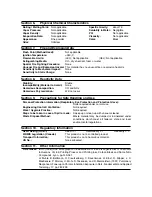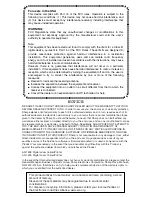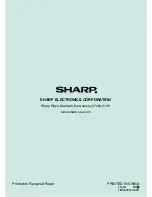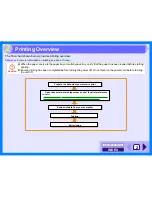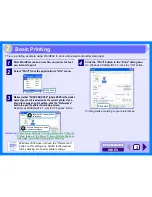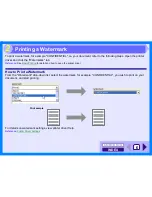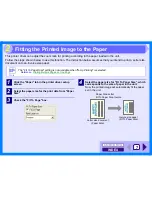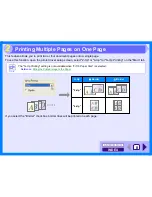
Date Issued:Nov. 1, 2000
MATERIAL SAFETY DATA SHEET
MSDS No. F-01001
Section 1.
Product Identification
Product:
AR-152NT/T/FT/ST (Black Toner)
Section 2.
Supplier’s Name and Address
Sharp Corporation
22-22 Nagaike-cho, Abeno-ku, Osaka, Japan
Local suppliers are listed below. Please contact the nearest supplier for additional information.
(Country)
(Name and Telephone Number)
U.S.A.
Sharp Electronics Corporation
Telephone number for information: 1-800-237-4277
Emergency telephone number:
1-800-255-3924
Canada
Sharp Electronics of Canada Ltd.
Telephone number for information: 905-890-2100
Emergency telephone number:
1-800-255-3924
United Kingdom
Sharp Electronics (U.K.) Ltd.
Telephone number for information: 01923-474013
Section 3.
Ingredients
Ingredients
CAS No.
Proportion
OSHA PEL ACGIH TLV Other Limits
Styrene-Acrylate copolymer
29497-14-1
> 88 %
Not listed
Not listed
None
Carbon black
1333-86-4
< 6.0%
3.5m
g
/m
3
3.5m
g
/m
3
None
Iron oxide
1309-38-2
< 4.5%
Not listed
Not listed
None
Metal Complex dye
109125-51-1
< 1.5%
0.5m
g
/m
3
0.5m
g
/m
3
None
109125-50-0
84179-66-8
Section 4.
Hazardous Identification (Emergency Overview)
Toner is a fine, black powder possessing no immediate hazard. There are no anticipated carcinogenic
effects from exposure based on animal tests performed using toner. When used as intended according
to instructions, studies do not indicate any symptoms of fibrosis will occur.
Section 5.
Health Hazard Data
Route(s) of Entry:
Inhalation?
Skin?
Ingestion?
Yes
No
Possible but very unusual.
Health Hazards:
Acute oral toxicity ------------- LDLo of this toner is over 2,000m
g
/k
g
.
Mutagenicity -------------------- The result of Ames test is negative.
Carcinogenicity:
In 1996 the IARC reevaluated carbon black as a Group 2B carcinogen (possible
human carcinogen). This classification is given to chemicals for which there is
inadequate human evidence, but sufficient animal evidence on which to base an
opinion of carcinogenicity. The classification is based upon the development of lung
tumors in rats receiving chronic inhalation exposures to free carbon black at levels
that induce particle overload of the lung. Studies performed in animal models other
than rats did not show any association between carbon black and lung tumors.
Moreover, a two-year cancer bioassay using a typical toner preparation containing
carbon black demonstrated no association between toner exposure and tumor
development in rats.
Chronic Effect:
In a study in rats of chronic inhalation exposure to a typical toner, a mild to moderate
degree of lung fibrosis was observed in 92% of the rats in the high concentration
(16m
g
/m
3
) exposure group, and a minimal to mild degree of fibrosis was noted in
22% of the animals in the middle (4m
g
/m
3
) exposure group, but no pulmonary change
was reported in the lowest (1m
g
/m
3
) exposure group, the most relevant level to
potential human exposures.
Signs and Symptoms of Exposure:
Minimal irritation to respiratory tract may occur as with exposure
to any non-toxic dust.
Medical Conditions Generally Aggravated by Exposure:
None
Emergency and First Aid Procedures:
Inhalation;
Remove to fresh air. If effects occur, consult medical personnel.
Eye;
In case of contact, immediately flush eyes with water for 15 minutes.
{
Summary of Contents for AR-153E N
Page 85: ......


















